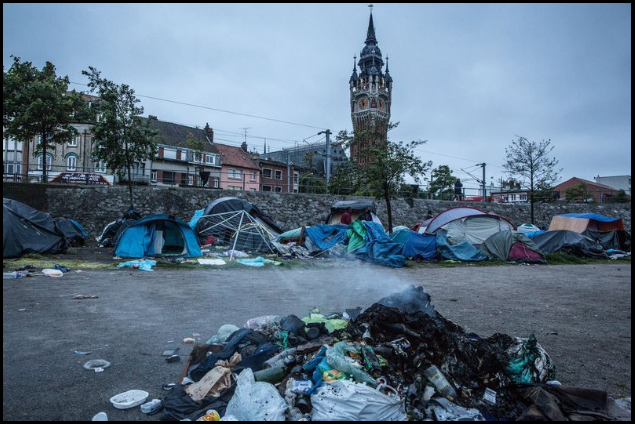
(Picture above: Le Monde - Rest of pictures: Calais Migrant Solidarity)
On Wednesday more than 300 police descended on Calais to evict three tent camps in the city centre which have existed since last October. The «Syrian camp», which was set up following the occupation of the port, the «Eritrean camp» under the bridge, which was established after the eviction of their squat, also in October, and a smaller camp close to the food distribution. Together these places were home to around 650 people in Calais, refugees who hoped to get an opportunity to cross the Channel to England.
The state has tried to disguise this police operation as a humanitarian intervention, citing scabies and poor sanitation to justify destroying people’s homes without providing them with any alternative solution. They neglect to mention that these problems exist only because they have forced people to live in very crowded conditions without access to toilets, showers, or places to wash their clothes and bedding.
They legitimize the intervention of the state by painting a picture of migrants as diseased and unable to care for themselves, rather than accepting responsibility for creating the circumstances which have caused the problems.
The second part of the operation did not go much better for the prefecture. After the camps were cleared of inhabitants, buses arrived, supposedly to take people to have a shower and receive clean clothes and blankets. Once again, translators were busy trying to convince everyone to get on board, but without a word about what would happen after the humanitarian activities had finished. Hardly anyone went and many times the translators and authorities were told to “Go take a shower!” themselves. Afterwards, two people who accepted were taken to detention centres 150 km from the city.

In preparation for the destruction of their homes, a large number of people moved occupied the SALAM food distribution area Monday night. Wedneaday, as the evictions took place, more and more people brought their belongings inside, intending to stay. Fearing that police might try to break in to evict and arrest them, they barricaded the entrances.

Soon afterwards, representatives of the Prefecture came to negotiate. The occupants demanded to continue their occupation of SALAM the following day and to be given a space to build a camp without fear of police harassment. Moreover, they demanded the construction of showers, toilets, and other sanitation facilities, so that they could live in health and dignity while they are stuck at the border. In the end, the state conceded that they would not send police to evict the space for the next few days, but asked people to leave by themselves and move to areas outside the city centre. They made no promises about police interventions, only vaguely suggesting that if people stayed in smaller groups outside Calais, they might be able to stay for a while. It is obvious that the police want to isolate people in remote places where they will be vulnerable to attacks without fear of public monitoring. This is a scenario that the people who have been living in the jungles on the outskirts of Calais have known now for a long time.What is clear from today is that the state is doing all it can to sweep these people under the rug, without anyone seeing them directly perpetrate this violence. The violence of Europe’s border regime must be invisible. In order to hide their hypocrisy, they offer only a single choice: slip away quietly or be pushed.



.jpg)


No comments:
Post a Comment